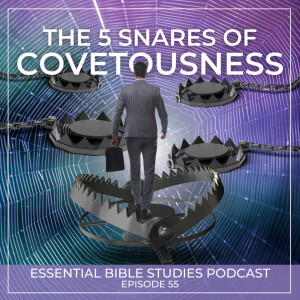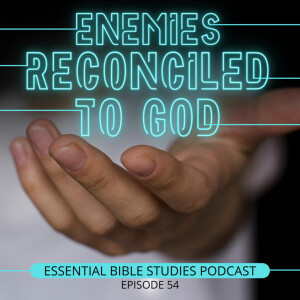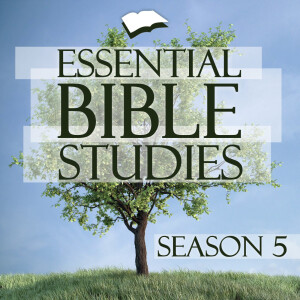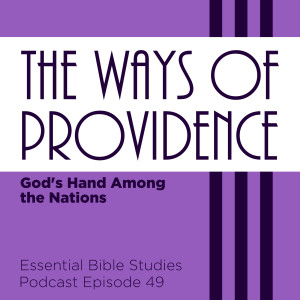Essential Bible Studies
The Essential Bible Studies podcast is an introductory discussion around Biblical first principles. The Bible is a complex book. It’s easy to misunderstand and get off track if you don’t grasp its basic teachings. The show engages in key passages and unpacks them in a lively conversation to reveal how they touch on our core beliefs. Your hosts bring with them years of experience as presenters from the Learn to Read the Bible Seminars. Hosted by the Book Road Christadelphians.
The Essential Bible Studies podcast is an introductory discussion around Biblical first principles. The Bible is a complex book. It’s easy to misunderstand and get off track if you don’t grasp its basic teachings. The show engages in key passages and unpacks them in a lively conversation to reveal how they touch on our core beliefs. Your hosts bring with them years of experience as presenters from the Learn to Read the Bible Seminars. Hosted by the Book Road Christadelphians.
Episodes

Monday Mar 06, 2023
In Remembrance (Part 2) - The Cup
Monday Mar 06, 2023
Monday Mar 06, 2023
During the last supper, Jesus gathered with his disciples and shared bread and wine with them in a very significant way. He declared that the bread represented his body and the cup of wine his blood. This meal was not just a one time event but something Jesus commanded his disciples to do often. Nick and Tim continue the study by looking closely at the symbology of the cup and the importance of the new covenant.
Study aids
Bread & Wine Parallel Records Handout
Bread & Wine Summary Handout
Key verse
"In the same way also he took the cup, after supper, saying, “This cup is the new covenant in my blood. Do this, as often as you drink it, in remembrance of me.”"1 Corinthians 11:25
Cup of Wine
Cup symbolizes ones portion or lot in life (Psalm 16:5; Psalm 11:6)
The word “wine” is never used… cup or fruit of the vine.
New Covenant
Christ said, this cup is the new covenant in my blood.
The book of the law was the book of the covenant (Ex 24)
But there was a problem, with the old covenant it could not save. Gal 3:11,21
The new covenant was then established in Faith and could offer salvation. Heb 8:7-13
This cup of wine therefore spoke of this new covenant that could save and provide forgiveness of sins.
How was it possible?
Christ said, new covenant “in my blood”
Blood in scripture represents life Lev. 17:11-14. Could not eat blood under the law.
Christ lived a perfect life of obedience 1 Peter 2:21-24 cp. 1 Peter 1:19 “precious blood of Jesus Christ.”
Thereby we have forgiveness of sins 1 John 1:7 for it cleanses or purifies the conscience.
However not available to all
Must be in Christ Gal. 3:14How? By baptism Gal. 3:27
Share in fellowship
1 Cor. 10:16
Fellowship with God Eph. 2:13
Follow us on... Facebook: https://www.facebook.com/essentialbiblestudies Instagram: https://www.instagram.com/essentialbiblestudies/ X: https://x.com/bible_podcast Get it... Get an invite to our Tuesday night Bible Studies at essentialbiblestudies.org Request a free Essential Bible Studies media kit

Monday Feb 27, 2023
In Remembrance (Part 1) - The Bread
Monday Feb 27, 2023
Monday Feb 27, 2023
During the last supper, Jesus gathered with his disciples and shared bread and wine with them in a very significant way. He declared that the bread represented his body and the cup of wine his blood. This meal was not just a one time event but something Jesus commanded his disciples to do often. We welcome Nick to this episode to discuss his in-depth studies on the symbolism involved and what it means for our lives.
Study aids
Bread & Wine Parallel Records Handout
Bread & Wine Summary Handout
Key verse
"And he took bread, and when he had given thanks, he broke it and gave it to them, saying, “This is my body, which is given for you. Do this in remembrance of me.”"Luke 22:19
How did it begin?
Night before Jesus died, upper room Matt 26:26-30 (also recorded in Mark 14, and Luke 22)Why the bread and wine?
Luke 22:19, 1 Cor 11:24,25 “Do this in remembrance of me” and 1 Cor. 11:26 “to proclaim the Lord’s death.”
Jesus was known for this (Luke 24:35)
The believers continued in this Acts 2:42, when and how often? Acts 20:7
What does it mean?
Bread in scripture is a symbol of food, and is seen as the fundamentals for life. As such it became a symbol of man’s labour to produce food. Gen 3:19; John 6:26-27
Christ took this bread, he broke it and said this my body which is given for you, this do in remembrance of me. He wanted the disciples to remember how he lived his life in giving himself for others. Christ just demonstrated this literally as he washed their feet (still stuck in their minds John 13:15-17)
Symbol of body
Christ said “this is my body”
Represents a body of believers 1 Cor 10:16-17; 1 Cor 12 (beautiful analogy of a group of believers working together as one body) ends with v27
Taking of the bread we therefore examine ourselves (1 Cor. 11:28), how we are helping the body of Christ (1 Cor. 11:29)
Fellowship
Conclusion of self examination (1 Cor. 11:28) - we are all sinners
Thereby have fellowship as realizing the need to work together 1 Cor 10:16-17
Follow us on... Facebook: https://www.facebook.com/essentialbiblestudies Instagram: https://www.instagram.com/essentialbiblestudies/ X: https://x.com/bible_podcast Get it... Get an invite to our Tuesday night Bible Studies at essentialbiblestudies.org Request a free Essential Bible Studies media kit

Monday Feb 20, 2023
Hell (Part 2) - The Unquenchable Fire
Monday Feb 20, 2023
Monday Feb 20, 2023
A discussion on hell would not be complete without talking about fire. Why are hell and fire connected? Josh and Tim continue the discussion from last week by talking about the word for hellfire Gehenna and why Jesus warned about this unquenchable fire.
Key Verse: “Do not fear those who kill the body but cannot kill the soul. Rather fear him who can destroy both soul and body in hell.” (Matthew 10:28 ESV)
Part 1 - Not Abandoned to Hades
Introduction
Popular ideas of hell fire
Overview of the words for “hell” – Sheol, Hades and Gehenna
Definition and Location
Gehenna = Valley of Hinnom
Bible Dictionary entries
History in Old Testament
Valley SW of Jerusalem (Josh. 15:8)
Place where idolaters made their children pass through the fire (Ahaz 2 Chr. 28:3; Manasseh 2 Chron. 33:6). Defiled by King Josiah (2 Kings 23:10).
Becomes symbolic of place of judgment (Jer. 7:31-32; Isa. 30:30,33)
New Testament
Mark 9:47 - Place of final judgement.
Jesus quoting from Isa. 66:24, 15-16.
Is this literal? Cutting off the hands/feet, worms living forever.
Jude 7 - The unquenchable fire means nobody can put it out until it has completely destroyed (cp. Jer. 17:27; Mal. 4:1)
Matt. 18:8 – The everlasting fire means the effects will be forever (cp. 2 Thess. 1:9; Mal. 4:1)
Matt. 10:28 – Complete destruction
Rev. 20:14 – The lake of fire
Final conclusion
Follow us on... Facebook: https://www.facebook.com/essentialbiblestudies Instagram: https://www.instagram.com/essentialbiblestudies/ X: https://x.com/bible_podcast Get it... Get an invite to our Tuesday night Bible Studies at essentialbiblestudies.org Request a free Essential Bible Studies media kit

Monday Feb 13, 2023
Hell (Part 1) - Not Abandoned to Hades
Monday Feb 13, 2023
Monday Feb 13, 2023
In this episode Josh and Tim tackle the subject of hell. There are a lot of misconceptions about hell that a simple study like this will dispel. While it might not seem like a very positive subject, in the end, there is a message of hope that is very powerful.
Key Verse: “Therefore my heart was glad, and my tongue rejoiced; my flesh also will dwell in hope. For you will not abandon my soul to Hades, or let your Holy One see corruption.” Act 2:26-27
Study Help: Every passage with Hell as Sheol or Hades
Introduction
Confusion over the word “hell”
Reminder of past episodes that serve as a basis for this study
We Shall Not All Sleep
The Parable of the Rich Man and Lazarus
The Creation of Man … First Natural, Then Spiritual
Overview of the words for “hell” – Sheol, Hades and Gehenna
To translate or transliterate?
The OT Sheol
A place for all the dead
Gen. 37:35 – 1st occurrence. Jacob’s expectation to be there.
Psa. 89:47-48 (NET) – Everybody dies, the power of Sheol
1 Sam. 2:6 – Hannah’s hope in the resurrection
Descriptions of Sheol
Psa. 6:5 (Isa. 38:18) – No praise of God
Job 17:13-16 – place of darkness, corruption, worms and dust
Ecc. 9:10 – No work or thought
Isa. 14 / Ezek. 32 – Not to be taken literally
Transition to the NT
Acts 2:27,31 / Psa. 16:10 – The connection with Jesus
Rev. 1:18 (cp. Zech. 9:11) – How Jesus overcame and has the keys to overcome the power of the grave
Final conclusion
Follow us on... Facebook: https://www.facebook.com/essentialbiblestudies Instagram: https://www.instagram.com/essentialbiblestudies/ X: https://x.com/bible_podcast Get it... Get an invite to our Tuesday night Bible Studies at essentialbiblestudies.org Request a free Essential Bible Studies media kit

Monday Feb 06, 2023
The Five Snares of Covetousness
Monday Feb 06, 2023
Monday Feb 06, 2023
In this episode we delve into some of the practical sides of recognizing sin in our lives and being able to deal with it. Covetousness is a great example of this. A sin that we might not know about unless God had told us not to covet. It's so important that it will exclude us from the kingdom of God. Frank joins Tim for interesting insights from his life on at least five areas to watch out for when it comes to covetousness.
Key verse: "Keep your life free from love of money, and be content with what you have, for he has said, “I will never leave you nor forsake you. So we can confidently say, “The Lord is my helper; I will not fear; what can man do to me?"" Hebrews 13:5-6
Introduction
The 10th commandment – Thou shalt not covet (Ex. 20:17). All other commandments seem to be external, but the 10th is obviously a commandment about how we think.
The battle against sin in the mind (Rom. 7:7,22-23)
The importance of recognizing and dealing with the sin of covetousness
Exclusion from the kingdom of God (Eph. 5:3-5; 1 Cor. 6:9-10)
The root of all evil (1 Tim. 6:9-11)
Defining Covetousness
English meaning
Hebrew meaning
Greek meaning
Five Snares of Covetousness
The snare of the credit card (Rom. 13:7-8)
Buying things we want but do not really need, on a credit account, because we do not have sufficient money to pay for it.
When we only pay the minimum balance instead of the whole balance on a credit account.
The lure of advertising and buying on impulse
Some stores are set up to encourage buying on impulse.
This includes buying more of a product than we really need.
Sometimes the store price is below their cost.
One needs to make a list and stick to it.
The deception of get rich quick schemes (lotteries, stock market)
Huge payouts sound good and we can justify it to ourselves
Actually winning would create more difficulties
Investing wisely is good but must be careful not to get caught up in it all
The enticement of entertainment and social media
Most entertainment is the idolization of man. Everybody wants to be like the star.
Social media is filled with people trying to be influencers
The pitfalls of keeping up with the Jones
We spend a lot of money just to keep up.
Sometimes it is purely a matter of pride.
Sometimes expectations are too high and we need to lower them. We don’t really need the latest and greatest.
We live in a very wasteful society.
The positives
The flesh can never be satisfied (Ecc. 5:10). We always live to our means.
Putting trust in God (Heb. 13:5-6)
Godliness with contentment is great gain (1 Tim. 6:6)
Final conclusion
Follow us on... Facebook: https://www.facebook.com/essentialbiblestudies Instagram: https://www.instagram.com/essentialbiblestudies/ X: https://x.com/bible_podcast Get it... Get an invite to our Tuesday night Bible Studies at essentialbiblestudies.org Request a free Essential Bible Studies media kit

Monday Jan 30, 2023
Enemies Reconciled to God
Monday Jan 30, 2023
Monday Jan 30, 2023
Key verse: “For if while we were enemies we were reconciled to God by the death of his Son, much more, now that we are reconciled, shall we be saved by his life.” Romans 5:10
Introduction
Enemies with God
Romans 5:8-10
What does it mean to be an enemy?
What causes the hostility – our sins.
James 4:4 – being a friend of the world causes enmity with God
Where is the separation?
Col. 1:21 – This takes place in our minds (cp. Gen. 6:5 vs. Isa. 26:3)
Romans 8:5-7 the carnal mind is enmity with God
Reconciliation with God brings peace
Col. 1:20
Eph. 2:13-17
Rom. 5:1, 10-11
Defining true peace with God
Final conclusion
Visit our website at www.essentialbiblestudies.org to sign up for a free media kit or join our Tuesday night online Bible study.
Follow us on... Facebook: https://www.facebook.com/essentialbiblestudies Instagram: https://www.instagram.com/essentialbiblestudies/ X: https://x.com/bible_podcast Get it... Get an invite to our Tuesday night Bible Studies at essentialbiblestudies.org Request a free Essential Bible Studies media kit

Monday Jan 23, 2023
God is Just and the Justifier
Monday Jan 23, 2023
Monday Jan 23, 2023
Key Verse: “It was to show his righteousness at the present time, so that he might be just and the justifier of the one who has faith in Jesus." Romans 3:26
Introduction
The conundrum of how a just God can save sinners
Why did Jesus have to die?
A core teaching on this in Romans 3:9-28
Chapter 3:9-24
The terrible sinfulness of all men (v.9-20, 23). Our knowledge of sin brings a recognition of guilt (v. 19).
The righteousness of God (v. 21-22) and the meaning of justification.
“By his grace” (v. 24). This is his gift. It is a balance of grace & truth.
Chapter 3:25
The meaning of propitiation
Faith in his blood – How does Jesus fit in? A man of spotless character who condemned sin.
Chapter 3:26-28
God is just and the justifier of all who believe
Justified by faith
Final conclusion
Previous episodes that provide background to this subject:
Sin in Five Verses
Sin Entered the World
The Curse on the Serpent
The Virgin Birth
The Word was made Flesh
Quote by Robert Roberts:
“God’s method for the return of sinful man to favour required and appointed the putting to death of man’s condemned and evil nature in a representative man of spotless character, whom He should provide, to declare and uphold the righteousness of God, as the first condition of restoration, that He might be just while justifying the unjust, who should believingly approach through him in humility, confession and reformation” Robert Roberts, Diary of a Voyage, pg. 68
Follow us on... Facebook: https://www.facebook.com/essentialbiblestudies Instagram: https://www.instagram.com/essentialbiblestudies/ X: https://x.com/bible_podcast Get it... Get an invite to our Tuesday night Bible Studies at essentialbiblestudies.org Request a free Essential Bible Studies media kit

Monday Jan 16, 2023
Blessed is the One Who Reads
Monday Jan 16, 2023
Monday Jan 16, 2023
Welcome to Season 5!
Part of being a good Bible student is being a good Bible reader. Wayne Coutu joins Tim Young for a conversation about the importance of consistent daily Bible reading and how to go about it.
Resources:
Website with the daily readings and commentary - The Daily Bible Readings
YouVersion app with daily reading planner
Apple app - Daily: Bible Reading
Outline:
Key verse: Rev. 1:3
Introduction
God speaks to us through his Word (like a missed call or voicemail)
We speak to God through prayer (like wanting to share good/bad news with a friend)
Matt. 7:21-23 - God wants a relationship with us but he has to know us (Gal. 4:9)
The Importance of Reading God’s Word daily
Rev. 1:3 – Read, hear and keep
Deut. 6:6-9 - Heart, teach children, talk of them, sign upon hands, upon posts and gates of the house
Reading with a Plan
The Bible Companion (dailyreadings.org.uk)
The benefits of reading with others / reading aloud
Sometimes we wonder why we are reading. The answer may be there immediately or later.
Read with an objective – ask questions, look for themes
Final conclusion – Attention vs Intention
Follow us on... Facebook: https://www.facebook.com/essentialbiblestudies Instagram: https://www.instagram.com/essentialbiblestudies/ X: https://x.com/bible_podcast Get it... Get an invite to our Tuesday night Bible Studies at essentialbiblestudies.org Request a free Essential Bible Studies media kit

Monday Dec 05, 2022
Season 5 Trailer
Monday Dec 05, 2022
Monday Dec 05, 2022
The first episode of the Essential Bible Studies podcast season FIVE premiers on January 16th, 2023.
Follow us on
Facebook: https://www.facebook.com/essentialbiblestudies
Instagram: https://www.instagram.com/essentialbiblestudies/
Twitter: https://twitter.com/bible_podcast
Get an invite to our Tuesday night Bible Studies at essentialbiblestudies.org
Follow us on... Facebook: https://www.facebook.com/essentialbiblestudies Instagram: https://www.instagram.com/essentialbiblestudies/ X: https://x.com/bible_podcast Get it... Get an invite to our Tuesday night Bible Studies at essentialbiblestudies.org Request a free Essential Bible Studies media kit

Monday Aug 08, 2022
Seek First the Kingdom of God
Monday Aug 08, 2022
Monday Aug 08, 2022
Recently my good friends Peter and Larry asked me to join them on their very first episode of a new podcast called “Come to Life”. I jumped at the chance. As the name suggests it’s a podcast that deals with a lot of the issues of life like how to pray or coping with grief or overcoming addictions. They interview all sorts of fascinating personalities. It’s a very interesting mix of subjects.
The foundation of it all is the word of God, using the Bible as their guide. With that in mind they wanted to start off by establishing what is behind every episode for them and that is the promise of God’s coming kingdom. God’s plan and purpose for everyone. Jesus Christ told us to seek first the Kingdom of God. If Jesus says its first, then what else could be more important?
I encourage you to check out the Come to Life podcast on Apple Podcasts or wherever you listen to podcasts.
https://cometolifepodcast.podbean.com/
https://podcasts.apple.com/us/podcast/the-come-to-life-podcast/id1583424714
Follow us on... Facebook: https://www.facebook.com/essentialbiblestudies Instagram: https://www.instagram.com/essentialbiblestudies/ X: https://x.com/bible_podcast Get it... Get an invite to our Tuesday night Bible Studies at essentialbiblestudies.org Request a free Essential Bible Studies media kit

Monday Apr 18, 2022
Testimony and Reflections Season 4
Monday Apr 18, 2022
Monday Apr 18, 2022
Frank Abel joins Tim Young to finish off Season 4 with his testimony and reflections on his life.
Episode's of the TV show Great News for the World with footage of preaching at Allan Gardens in Toronto are on the Christadelphian TV channel on YouTube.
Ron Abel's book Wrested Scripture can be purchased as a book in the UK or the US and found on a website.
Follow us on... Facebook: https://www.facebook.com/essentialbiblestudies Instagram: https://www.instagram.com/essentialbiblestudies/ X: https://x.com/bible_podcast Get it... Get an invite to our Tuesday night Bible Studies at essentialbiblestudies.org Request a free Essential Bible Studies media kit

Monday Apr 11, 2022
The Ways of Providence (Part 2) - God’s Hand Among the Nations
Monday Apr 11, 2022
Monday Apr 11, 2022
Our study of God’s providence continues this time with a focus on how God works among the nations. The Bible gives us key insights on God’s view of the kingdoms of men and how he is ultimately in control to bring about his kingdom on earth. Join Dan and Tim as they grapple with difficult questions about how God’s rules in the Kingdoms of men, how these rulers are still responsible to God and what this means for the believer’s involvement in politics.
Visit the Bible Basics Webinar
Key Verse:
“The sentence is by the decree of the watchers, the decision by the word of the holy ones, to the end that the living may know that the Most High rules the kingdom of men and gives it to whom he will and sets over it the lowliest of men.” Daniel 4:17
Show Notes:
God is in control of world events
God, Daniel and Nebuchadnezzar (three times Daniel 4:17, 25, 32 cp v. 35; 2 Chronicles 20:6)
Proverbs 21:1 - God turns the heart of kings like a stream of water
God’s use of Kings
Cyrus, God’s anointed (Isaiah 45:1-3; Ezra 1:1)
Nebuchadnezzar revisited (Ezekiel 30:21-25)
They are unaware (Daniel 4:29-31)
They are still responsible for their actions (Jeremiah 25:8-9,12-13)
One of the reasons that Christadelphians are not involved in politics
Our awareness that God is in control
A great comfort to know that all things will work out according to God’s will
Daniel’s advice to Nebuchadnezzar (4:27)
We shouldn’t get caught up in the criticism of government but pray for them (1 Timothy 2:1-2)
Follow us on... Facebook: https://www.facebook.com/essentialbiblestudies Instagram: https://www.instagram.com/essentialbiblestudies/ X: https://x.com/bible_podcast Get it... Get an invite to our Tuesday night Bible Studies at essentialbiblestudies.org Request a free Essential Bible Studies media kit






